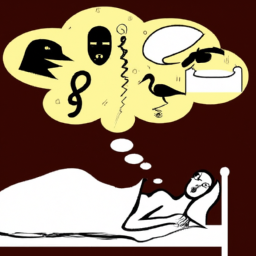Have you ever experienced waking up in the middle of the night, sweating and breathing heavily, following a dream about falling?
It’s a common experience that many people have had, including myself. But what causes these dreams? Is there a deeper meaning behind them?
In this article, I will explore different theories and explanations for why we have dreams about falling. From Freudian and Jungian theories to anxiety and stress, neurological and physiological factors, and even cultural beliefs and myths, we will delve into the various perspectives on this common dream experience.
Additionally, we’ll examine the concept of lucid dreaming and how dream analysis and interpretation can shed light on the messages our dreams may be trying to communicate.
So let’s jump in and uncover the mysteries of falling dreams together.
Key Takeaways
- Falling dreams are a common experience for many people and can have various theories and explanations, including psychological theories, Freudian theory, and Jungian theory.
- Falling dreams can have different meanings for different people and can be caused by anxiety and stress, as well as physiological factors.
- Falling dreams can be a way for the brain to practice dealing with potential dangers and can vary in cultural beliefs and myths.
- Lucid dreaming can offer potential benefits, such as improved problem-solving abilities and reduced anxiety, and can lead to overcoming fears and phobias, improving creativity, and practicing skills.
Explanation of Falling Dreams
Falling dreams, one of the most common types of dreams, can be explained by a variety of psychological theories.
One theory is that falling dreams stem from the fear of failure. This fear can manifest itself in our subconscious mind as a feeling of falling or losing control. Falling in a dream can also represent a loss of power or status in our waking life, causing us to feel vulnerable and insecure.
Another psychological theory that explains falling dreams is the Freudian theory. According to Freud, falling dreams are a representation of repressed sexual desires or feelings of castration anxiety. Freud believed that our dreams were a manifestation of our unconscious thoughts and desires, and that falling dreams were a way for our subconscious to deal with repressed sexual energy.
With this in mind, it’s important to note that falling dreams can have different meanings for different people, and that there is no one-size-fits-all explanation for why we dream about falling.
Freudian Theory
Despite some criticism, Freudian theory suggests that our subconscious desires and fears manifest in our dreams, often represented by symbolic imagery. According to Freud, dreaming about falling represents a fear of losing control, whether that be in our personal or professional lives. It could also symbolize a fear of failure or inadequacy.
Freud believed that these anxieties stem from childhood experiences, such as being scolded or punished by a parent or authority figure.
However, Freud’s theories have been met with criticism from modern psychologists. Some argue that his emphasis on sexual and aggressive impulses as the root of all psychological issues is outdated and limited. Instead, they propose theories such as Jungian theory, which focuses on the collective unconscious and archetypes.
Jungian Theory
If you’re looking for an alternative to Freudian theory, you might be interested in exploring Jungian theory. This theory suggests that our dreams aren’t just the result of our personal experiences and desires, but they also tap into the collective unconscious, which is a shared pool of universal human experiences, thoughts, and emotions. According to Jung, our dreams can reveal deeper insights into our unconscious mind and help us understand ourselves better.
Here are some key concepts of Jungian theory that might help you understand why you have dreams about falling:
-
Archetypes: Jung believed that there are universal symbols and patterns that exist in all cultures and all individuals, such as the mother, the hero, the shadow, and the anima/animus. These archetypes can appear in our dreams and reveal important aspects of our psyche.
-
Individuation: Jung believed that our dreams can help us integrate the different parts of ourselves and become more whole and self-aware. By analyzing our dreams, we can uncover the hidden aspects of our personality and work towards our personal growth and development.
-
Active imagination: Jung encouraged his patients to engage in an active dialogue with their dreams and to explore their symbols and meanings. He believed that by actively participating in the dream process, we can gain a deeper understanding of our unconscious mind.
-
Symbolism: Jung believed that dreams use symbols and metaphors to convey deeper meanings that cannot be expressed in words. By analyzing the symbols in our dreams, we can uncover the hidden messages and insights that our unconscious is trying to communicate to us.
Understanding Jungian theory can provide a new perspective on why we have dreams about falling and what they might mean for our personal growth and self-awareness.
However, dreams about falling can also be a sign of anxiety and stress, which is a topic we will explore in the next section.
Anxiety and Stress
Experiencing anxiety and stress can impact our mental and physical well-being, affecting our daily lives. These feelings can manifest in many ways, such as difficulty sleeping, a racing heart, and even dreams about falling.
When we are under a lot of stress, our brains can become hyperactive and start to create vivid and intense dreams. Falling dreams can be a reflection of our fear of losing control or feeling overwhelmed by the challenges we face.
These dreams can also be a way for our brains to process and cope with the stress and anxiety we’re experiencing. As we fall in our dreams, our brains are trying to make sense of the feelings of helplessness and vulnerability that we may be experiencing in our waking lives.
This can be a way for us to confront and overcome our fears, allowing us to feel more in control and less overwhelmed. As we explore the neurological and physiological factors behind falling dreams, we can gain a better understanding of the complex ways in which our brains process stress and anxiety.
Neurological and Physiological Factors
The brain’s response to stress and anxiety can lead to vivid and intense dreams, including those where the dreamer feels as though they are plummeting through the air. This is because the amygdala, a small almond-shaped structure in the brain responsible for processing emotions, is activated during periods of stress.
As a result, the brain’s limbic system, which is responsible for regulating emotions, becomes overactive and can influence the content of our dreams. Additionally, physiological factors such as changes in heart rate and blood pressure during periods of stress can also contribute to dreams about falling.
These physical sensations can be incorporated into our dreams, leading to the sensation of falling. Understanding the neurological and physiological factors behind these types of dreams can help us better understand our own responses to stress and anxiety from an evolutionary perspective.
Evolutionary Perspective
You might be surprised to learn that the evolutionary perspective offers valuable insight into why we have such vivid dreams about falling. Our ancestors, who lived in trees and had to navigate their way through branches and leaves, had to be constantly aware of their surroundings and the potential dangers they faced. Falling from a tree could mean serious injury or death, so it’s no wonder that our brains have evolved to have a heightened sensitivity to the fear of falling.
This fear of falling has been passed down through generations, and it’s not just limited to those who lived in trees. Even those who didn’t have to worry about falling from great heights still had to navigate uneven terrain and other obstacles, so it’s possible that this fear of falling is a universal human trait.
Additionally, dreams about falling may serve as a way for our brains to practice dealing with potential dangers, helping us to better prepare for real-life situations.
Moving on to the next section about cultural beliefs and myths, it’s interesting to note that many cultures have their own interpretations of falling dreams.
Cultural Beliefs and Myths
It’s fascinating to explore the various interpretations of falling dreams in different cultures and the myths surrounding them.
In some cultures, falling dreams are seen as a sign of impending doom or bad luck. In others, they are believed to represent a transition or transformation in one’s life.
For instance, in Chinese culture, falling dreams are associated with success and growth. In Hinduism, falling dreams are seen as a reminder to let go of attachment and trust the journey of life.
The cultural beliefs and myths around falling dreams highlight how our perceptions and interpretations of dreams are shaped by our environment and upbringing. These interpretations can also influence our emotional response to falling dreams, leading to feelings of fear or excitement.
However, exploring these cultural interpretations can also provide insight into the deeper meaning behind our dreams.
In the next section, I’ll delve into the concept of lucid dreaming and how it can help us gain control over our dreams.
Lucid Dreaming
I’ve always been fascinated by the idea of controlling my dreams, so when I heard about lucid dreaming, I was immediately intrigued.
Lucid dreaming is the ability to become aware that you’re dreaming and to control the dream’s content. There are various techniques that people use to induce lucid dreaming.
The potential benefits include improved problem-solving abilities and reduced anxiety.
Definition and Techniques
There’s a multitude of techniques available to help interpret and analyze dreams of falling. One common method is keeping a dream journal, where you write down your dreams as soon as you wake up. This helps you remember the details of the dream and identify any recurring themes or symbols.
Another technique is visualization, where you imagine yourself falling and then visualize a positive outcome, such as landing safely or sprouting wings and flying. This helps reframe the fear associated with falling in dreams and can lead to more positive dream experiences.
In addition to interpretation, another aspect of lucid dreaming is control and awareness. Once you become aware that you are dreaming, you can start to control the dream environment and manipulate the events taking place. For example, if you find yourself falling in a dream, you can try to fly or slow down the descent.
This can be achieved through various techniques, such as reality checks or setting intentions before going to sleep. With practice, you can gain more control over your dreams and turn falling dreams into thrilling experiences.
Control and Awareness
Congratulations, you’ve now got the power to manipulate and control your dreams once you become aware that you’re in them. This ability is known as lucid dreaming, and it can be a thrilling experience.
Being able to control your dreams means you can do anything you want, from flying to traveling to different dimensions. The possibilities are endless.
However, becoming aware of your dreams and controlling them takes practice and patience. One technique is to keep a dream journal and write down your dreams every morning. This will help you recognize patterns and recurring elements, which can be used as a cue to realize you’re dreaming.
Another technique is to perform reality checks throughout the day, such as looking at your hands or trying to push your finger through your palm. If these actions don’t work in real life, chances are you’re dreaming. Once you become aware that you’re in a dream, try to remain calm and focused to avoid waking up.
With the ability to control your dreams comes the potential for numerous benefits, such as overcoming fears and phobias, improving creativity, and even practicing skills in a safe and controlled environment.
By mastering lucid dreaming, you can unlock your imagination and explore the depths of your mind.
Potential Benefits
Unlocking the potential benefits of lucid dreaming can lead to overcoming fears and phobias, improving creativity, and practicing skills in a safe and controlled environment. By becoming aware that you’re dreaming, you can take control of the dream and steer it in a positive direction. This can be especially useful for those who suffer from anxiety or nightmares.
Lucid dreaming can also be a tool for practicing skills or rehearsing difficult situations. Athletes can use lucid dreams to mentally prepare for competitions, and public speakers can use them to practice giving speeches. By harnessing the power of lucid dreaming, we can tap into a whole new realm of personal growth and development.
With these benefits in mind, it’s no wonder why dream analysis and interpretation are such popular topics among those interested in unlocking the potential of their dreams.
Dream Analysis and Interpretation
When it comes to analyzing and interpreting our dreams, there are a variety of approaches to consider. As a psychology student, I’ve learned about the professional methods used by therapists and psychologists to help clients understand their dreams.
Additionally, I’ve found personal reflection and journaling to be helpful tools in uncovering the meaning behind my own dreams.
Finally, with the abundance of online resources available, there are many ways to explore and interpret the symbolism and messages within our dreams.
Professional Approaches
You’ll want to explore professional approaches if you’re curious about why you keep having dreams about falling. One of the most popular methods is to see a therapist who specializes in dream analysis. They can help you explore the symbolism behind your dreams and uncover any underlying emotions or beliefs that may be causing these recurring dreams.
Another approach is to consult with a sleep specialist. They can evaluate your sleep patterns and any potential underlying medical conditions that may be causing your dreams about falling. They may also recommend lifestyle changes or therapies to improve the quality of your sleep and reduce the frequency of these dreams. It’s important to remember that there is no one-size-fits-all approach, and you may need to try different methods before finding the one that works best for you.
As you explore these professional approaches, it may also be helpful to engage in personal reflection and journaling. By reflecting on your dreams and writing down your thoughts and feelings, you can gain deeper insights into the meaning behind your dreams. This can also help you identify any patterns or triggers that may be contributing to your dreams about falling. So, take some time to reflect and write down your thoughts, and see what insights you can gain.
Personal Reflection and Journaling
To gain a deeper understanding of the symbolism behind your recurring dreams about falling, try reflecting on your emotions and jotting them down in a journal. When I started doing this, I noticed a pattern in my dreams: I always felt anxious and scared right before the fall. This made me realize that my dreams about falling may represent my fear of failure and my lack of control in certain situations. By keeping track of my emotions and reactions to my dreams, I was able to identify certain triggers and work on developing coping mechanisms to deal with my anxieties.
Reflecting on my dreams and journaling about them also helped me identify recurring themes and symbols. For example, I noticed that the places where I fell in my dreams were always different, but the sensation of falling remained the same. This led me to believe that the location of my fall was not as relevant as the feeling of being out of control.
Understanding these symbols and themes has allowed me to analyze my dreams more deeply and find personal significance in them. For more information about dream analysis and interpretation, there are many online resources available.
Online Resources
Navigating the vast sea of online resources for dream analysis can be like searching for a needle in a haystack, but with a little intuition and guidance, it can lead to a treasure trove of self-discovery. One of the first websites I stumbled upon during my own dream analysis journey was dreammoods.com. This website offers a comprehensive dream dictionary that includes common interpretations for various symbols and themes that appear in dreams. Additionally, it includes a forum where users can share their dreams and receive feedback from others.
Another website that I found helpful was dreamdictionary.org. This website not only provides a dream dictionary, but also offers a section where users can browse dream themes and read about common interpretations. It also includes a feature where users can input their dream and receive a personalized interpretation. These online resources have been a helpful tool in my own journey towards understanding my dreams and the messages they may hold.
Frequently Asked Questions
Can falling dreams be a sign of a serious health issue?
As someone who has experienced falling dreams, I can say they are not necessarily a sign of a serious health issue. However, if they are accompanied by other symptoms, it’s best to consult a doctor.
Do people from certain cultures experience falling dreams more often than others?
From my experience, I haven’t noticed any cultural differences in the frequency of falling dreams. However, cultural beliefs and interpretations of the dream may vary.
Is there a way to prevent falling dreams from occurring?
I wish I could prevent falling dreams! Did you know that 75% of people experience falling dreams? Unfortunately, there’s no guaranteed way to stop them, but practicing relaxation techniques before bed can help.
How does medication or substance use affect the frequency of falling dreams?
Taking medication or substances can increase the frequency of falling dreams. Personally, I’ve noticed that when I take certain medications before bed, I tend to have more vivid and intense dreams about falling.
Can recurring falling dreams be a sign of a deeper psychological issue?
Recurring falling dreams can indicate unresolved fears or anxieties in my subconscious, potentially related to feelings of inadequacy or loss of control. Seeking therapy can help identify and address underlying psychological issues.
Conclusion
Well folks, after all this research, I’ve come to one conclusion: dreams about falling are just plain weird.
I mean, seriously, who wants to wake up in a cold sweat after dreaming about plummeting off a cliff or tripping down a flight of stairs?
But in all seriousness, while there may be various theories and explanations for why we have these dreams, at the end of the day, it’s just our brain playing tricks on us.
So next time you find yourself freefalling in your sleep, try not to take it too seriously. After all, it’s just your mind’s way of keeping you on your toes (or off them, in this case).
Sweet dreams, everyone!










